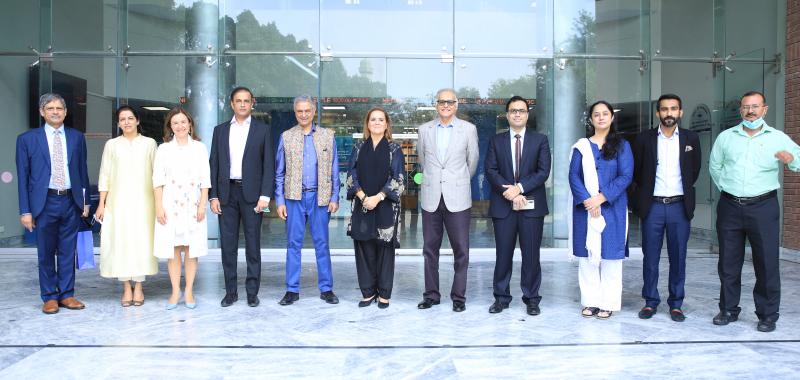
On Thursday, September 30, 2021, SDSB invited Ms Teresa Daban Sanchez, Resident Representative, International Monetary Fund (IMF), to speak with our faculty and students in the Conversations with Changemakers series. Honorary Dean, Dr Alnoor Bhimani, welcomed the distinguished guests and the participants and shared his thoughts on IMF’s Extended Fund Facility (EFF) program for Pakistan.
Dr Alnoor began the conversation, “Thank you, everyone, for coming here. As you know, we have a conversation series with changemakers, and we have two changemakers here. They are real changemakers as they change the country. You all know quite a bit about the IMF because their involvement in the country has been extensive for some time. Today what will be exposed to issues and economics of what it is to run a country such as Pakistan, with all its complexities. Who better than individuals from IMF who bring external expertise and understanding of economics. But I think also very heavily invested in understanding the country, its politics, its structures, its governance problems, its challenges from across the board; from education to health to sanitation, to energy and so forth. I welcome Teresa to present us with her thoughts, and then we will have a question and answer session with the audience.”
Teresa thanked SDSB for having her and the hospitality she was extended. “Our responsibility is to outreach different segments of the Pakistani population; young people, students, journalists, business people, academia, civil society – to explain what we are doing and how we are helping Pakistan and its constituencies and how things are perceived and what are the concerns and try to address the misunderstanding. So this is part of that activity; unfortunately, because of Covid, we had to suspend our trips.” Talking about Covid, Teresa said that Covid-19 brought a drastic change in the outlook and policy priorities. “There is higher expenditure on health and social safety nets and securing large extra funding support. There was a strong and decisive policy response by the government in both fiscal and monetary plans.”
Pakistan received USD 1.4 billion under the IMF Rapid Financial Instrument (RFI) by mid-April 2020. “This was a strong financial support by partners of Pakistan.” Pakistan also received funds from the World Bank and the Asian Development Bank. When speaking about the policy mix, Teresa said, “Monetary policy remains accommodative but with a change in direction in the latest Monetary Policy Committee while fiscal policy has turned to be expansionary after the FY2022 budget.”
However, she feels there are still risks involved in the current situation of Pakistan. “There is a risk due to higher global uncertainty, policy slippages and concerns of implementation capacity. The vested interests of the players involved also pose as a risk.” She feels that “the authorities’ calibration of policies and reforms is done by a package of measures that strike a balance between supporting the economy and ensuring structural reforms that maintain social conclusion.”
In conclusion, she said, “The authorities remain committed to ambitious policy actions and structural reforms to strengthen economic resilience, advance sustainable growth and achieve the EFFs mechanic terms.”
A recording of the conversation can be viewed by clicking here.








